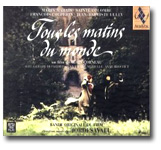Music |
Tous les Matins du Monde
By
Published: May 20, 2009
Category:
Classical
It is 1660, and we are at the home of Sainte-Colombe, probably the greatest French musician and composer for strings of the 17th century. But no one can hear him. His wife has died, and in his grief he has left the Court. Now he lives, visited only by his beautiful daughters, in the solitude of the country.
Does “Tous les Matins du Monde’ (“All the Mornings of the World”) sound like a fairy tale? Read on — it soon becomes even more like one.
Marin Marais, an ambitious young musician, makes a pilgrimage to see Saint-Colombe. How can he not? He has heard that grief and exile have deepened Sainte-Colombe’s art. As Marais tells us, "He could imitate the full range of the human voice, from a young woman’s sigh to an old man’s sob, from Henry IV’s battle cry to a child’s sleeping breath."
Sainte-Colombe agrees to become Marais’s teacher. But he cuts his instruction short. "You make music! You’re not a musician," he tells Marais. That is: Marais wants technical tricks, not deep knowledge. Alas for Saint-Colombe, one of his daughters gives Marais private instruction, in romance as well as music. And Marais goes on to become one of the Court’s favorite musicians.
Now the plot doubles on itself. Marais’s lover dies, and it’s his turn to grieve. At last he understands — music must be his salvation. And not just any music. Only the richly emotional compositions of Sainte-Colombe.
It does not hurt that the mature, ruined Marais is played by a sweating, fat Gerard Depardieu. Or that the young Marais is played by Guillaume Depardieu, blond and manly, and the son of Gerard. Or that the producers engaged the services of Jordi Savall, universally acclaimed as the world’s best violist. The soundtrack CD features music by Lully, Marais and Sainte-Colombe (yes, they were real people before they became characters in a film), and some extraordinary vocal performances of Couperin. “Delicious” understates — this music gives the images an almost physical reality.
Between Jordi Savall’s viol and Alain Corneau’s direction, music and milieu merge; you’ll feel as if the paintings of Vermeer had suddenly come to life. The pleasure of watching this film is intense; everything about it is drenched in the purest emotions. I was not in the least surprised to learn that “Tous les Matins” won 7 Cesars (the equivalent of our Academy Awards). Or that it launched a minor baroque revival on its release in 1991.
“Tous les Matins” is not just a film about a great artist and the price of making art. It is art itself.
To buy the CD of the soundtrack of “Tous les Matins” from Amazon.com, click here.
To buy the DVD of “Tous les Matins” from Amazon.com, click here.


